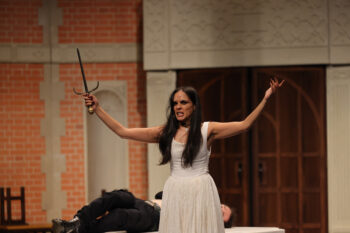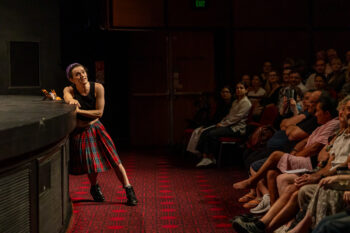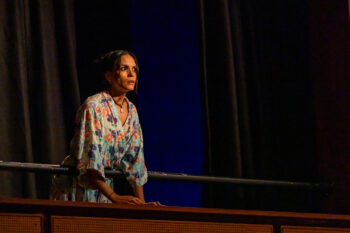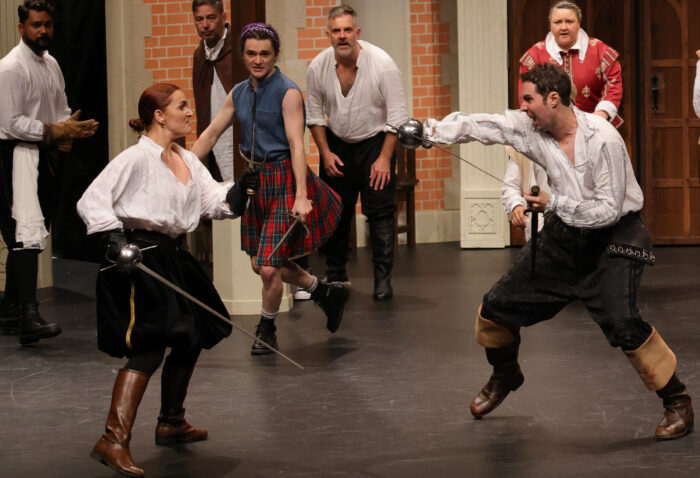Romeo & Juliet, at Sky City Theatre 17-25 February, directed by David Lawrence
ROMEO & JULIET must be one of the world’s most well-known tropes. But not exactly a well-known play (spoiler alert: they both die in the end, you know). “Never was a tale of more woe than this of Juliet and her Romeo.” But before the woe we see young love, young hope, and great drama. And remember, she’s not yet fourteen when our play starts.
 That these lovers are young isn’t un-important. At this age when passion is all-important, with emotions worn on the sleeve, the target of it is sometimes less so (last week it’s Rosalind, this it’s another, just met.) We understand the maid ready for love, and the young man in love with love. And who has written better scenes for them, to play out their star-crossed love? And who, on Auckland’s boards, has been a better Romeo to play out those scenes than Alistair Sewell? For a boy who could be insufferable, he has our support at every turn. At one minute charming, the next combative.
That these lovers are young isn’t un-important. At this age when passion is all-important, with emotions worn on the sleeve, the target of it is sometimes less so (last week it’s Rosalind, this it’s another, just met.) We understand the maid ready for love, and the young man in love with love. And who has written better scenes for them, to play out their star-crossed love? And who, on Auckland’s boards, has been a better Romeo to play out those scenes than Alistair Sewell? For a boy who could be insufferable, he has our support at every turn. At one minute charming, the next combative.
 The story itself, of course, is naturalistic theatre at its best, and simply told: “For stony limits cannot hold love out;/ And what love can do, that dares loves attempt./ Therefore they kinsmen are no stop to me.”
The story itself, of course, is naturalistic theatre at its best, and simply told: “For stony limits cannot hold love out;/ And what love can do, that dares loves attempt./ Therefore they kinsmen are no stop to me.”
The story has transferred so well to film and ballet and even musical because it is simple, yet powerful. (“When you’re a Jet/You’re a Jet all the way/From you first cigarette/To your last dyin’ day.”) And these are people we know. The teenaged lovers. The arguing youths. The fretting parents (Tyler Wilson-Kokiri’s final scenes with his daughter especially affecting.) We know them. They could be us, which makes the unfolding tragedy all the greater. All the more unbearable.
Pop-Up Globe Theatre is still without its Globe theatre, unfortunately, but with every successful performance like this one they get one step closer to its return. And under long-time artistic director David Lawrence, they’ve retained all the engaging mannerisms that worked best in the ‘Wooden O,’ and have been made to work here.
If there’s one scene from the play that’s justifiably famous, it’s the balcony scene and it were well done indeed, sir. Especially well done. I won’t spoil the surprise, but following the principle of ‘all-the-theatre’s a stage’ it nicely gets the audience on-side with the young lovers, to feel we’re all conspiring with them against their would-be tormentors.
And t’were all well done. All very well done. A triumph. A tribute to the production team who make the most of the unforgiving space, and to director Lawrence whose vision this is for audience engagement and laughs within disaster. (And he even gives himself a small Hitchcock-like cameo towards the end.)
Lawrence has the audience here fully engaged throughout. Even at halftime (at an unconventional spot in the drama), they remained (unusually) off their phones, still buzzing, eager to talk about the show. I spoke with one well-dressed lady at halftime who was so excited she could barely get the words out. “I haven’t been to one of these before,” she gushed. “The lines, the words, the actors … it’s just extraordinary! It makes me want to read Shakespeare.” Job done!
 Meanwhile past Pop-Up-Globe-o-philes (including this one) were standing around saying to each other: “They’re back!” And they were, with all the welcome informality, physical theatre, high art and belly laughs we Globe-o-philes came to love. A dropped line here, a false exit there, or even a dead body there that moves and stands up? It’s all a chance for laughter even as the tragedy plays out. Even our minor characters are characters.
Meanwhile past Pop-Up-Globe-o-philes (including this one) were standing around saying to each other: “They’re back!” And they were, with all the welcome informality, physical theatre, high art and belly laughs we Globe-o-philes came to love. A dropped line here, a false exit there, or even a dead body there that moves and stands up? It’s all a chance for laughter even as the tragedy plays out. Even our minor characters are characters.
The second half revolves around Friar Lawrence, his plans and counsel, in which role Kevin Keys holds it together powerfully. A shame, a tragedy even, when we discover that the good Friar on whom great trust is laid is in truth an abject plotter. A weak reed. And, it’s revealed, a coward, though too few fingers are pointed.
There are many touches that delight. The hungover courtiers. The wraiths in the tomb scene. That balcony scene. Salesi Le’ota’s Nurse who in her Widow Twankey way captures the stage with every entrance. And a truly affecting finish, almost bringing tears (Natasha Daniels’s finest moment).
One touch, this one of Shakespeare’s, has special resonance in these nearly-post-Covid times. The fate of these young lovers is finally sealed when a message is sent but not received. Why not? The messenger tells us why not: “The searchers of the town/Suspecting that were were both in a house/ Where the infectious pestilence did reign/ Seal’d up the doors, and would not let us forth.” In pre-Covid times, that news goes past us so quickly it’s barely noticed. But now we know: at that moment we know! We’ve been there too in those sealed-up houses, and we know at once how it’s all going to play out, Just as Shakespeare’s Elizabethan audience, so used to plague, would have known too. The understatement, as we now understand it, is brilliant.
It’s not all there, mind. I wish, I wish, I wish … I still wish for the occasional line of iambic pentameter. For more vocal projection, and less shouting. And some amplification to the music — and even some tune to it. (We weren’t vouchsafed that much even at the party scene.) And of course I wish it could be back again in that great space for which these great plays were written.
But this was a triumphant return for the Pop-Up-Globe troupe, hopefully auguring much more for the future.
Theatre Peter
Info and tickets here.
- Nicola Cheeseman is Back -dir. by Paul Gittins: Herald Theatre (Aotea Centre) 19 June – 7 July - June 20, 2024
- The Rime of the Ancient Mariner – Dir. by Paul Gittins: Pitt St Theatre (April 7) - April 8, 2024
- AIGA – Touch Compass Theatre, dir. by Moana Ete, Te Pou Theatre, Henderson March 20-24 - March 20, 2024

